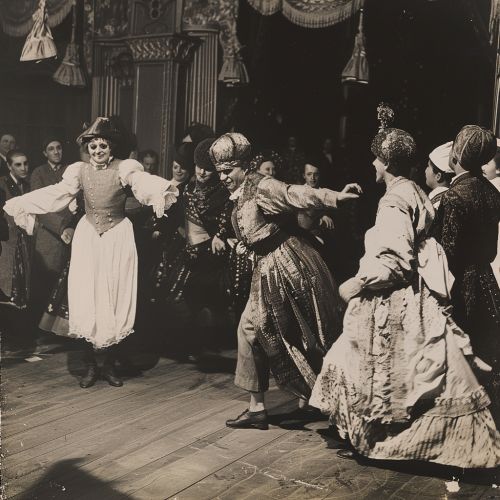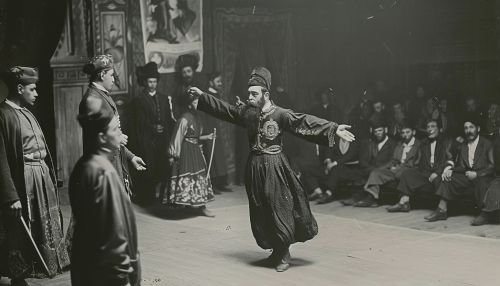Yiddish Literature: Difference between revisions
(Created page with "== Introduction == Yiddish literature encompasses a rich and diverse body of work written in the Yiddish language, which is historically associated with the Ashkenazi Jews of Central and Eastern Europe. This literary tradition spans several centuries and includes a wide range of genres, from religious texts and folklore to modernist poetry and prose. Yiddish literature provides a unique window into the cultural, social, and historical experiences of the Jewish people....") |
No edit summary |
||
| Line 31: | Line 31: | ||
Yiddish theater has a rich history, with roots in the Purim plays of the 16th century. By the late 19th century, Yiddish theater had become a major cultural force, with playwrights like [[Jacob Gordin]] and [[H. Leivick]] pushing the boundaries of the form. Yiddish drama often tackled social and political issues, reflecting the concerns of the Jewish community. | Yiddish theater has a rich history, with roots in the Purim plays of the 16th century. By the late 19th century, Yiddish theater had become a major cultural force, with playwrights like [[Jacob Gordin]] and [[H. Leivick]] pushing the boundaries of the form. Yiddish drama often tackled social and political issues, reflecting the concerns of the Jewish community. | ||
[[Image:Detail-79167.jpg|thumb|center|Photograph of a Yiddish theater performance in the early 20th century, showing actors on stage in period costumes.|class=only_on_mobile]] | |||
[[Image:Detail-79168.jpg|thumb|center|Photograph of a Yiddish theater performance in the early 20th century, showing actors on stage in period costumes.|class=only_on_desktop]] | |||
== Influence and Legacy == | == Influence and Legacy == | ||
Latest revision as of 11:06, 17 May 2024
Introduction
Yiddish literature encompasses a rich and diverse body of work written in the Yiddish language, which is historically associated with the Ashkenazi Jews of Central and Eastern Europe. This literary tradition spans several centuries and includes a wide range of genres, from religious texts and folklore to modernist poetry and prose. Yiddish literature provides a unique window into the cultural, social, and historical experiences of the Jewish people.
Historical Development
Early Beginnings
The origins of Yiddish literature can be traced back to the medieval period, with the earliest known texts dating from the 12th century. These early works were primarily religious in nature, including translations of biblical texts, commentaries, and ethical treatises. One of the most significant early texts is the Tseena Ureena, a Yiddish adaptation of the Hebrew Bible intended for women who were not literate in Hebrew.
The Renaissance of Yiddish Literature
The 19th century marked a renaissance in Yiddish literature, driven by the Haskalah, or Jewish Enlightenment. This period saw a shift from religious to secular themes, with writers exploring contemporary social issues, Jewish identity, and the challenges of modernity. Notable figures from this era include Mendele Mocher Sforim, often considered the "grandfather" of modern Yiddish literature, and Sholem Aleichem, whose works humorously depict the lives of Eastern European Jews.
The Golden Age
The late 19th and early 20th centuries are often referred to as the "Golden Age" of Yiddish literature. This period saw the emergence of a vibrant literary culture, with a proliferation of newspapers, journals, and publishing houses dedicated to Yiddish works. Key writers from this era include Isaac Bashevis Singer, who later won the Nobel Prize in Literature, and Sholem Asch, known for his novels and plays that often tackled controversial themes.
Major Genres and Themes
Poetry
Yiddish poetry has a long and varied tradition, encompassing both religious and secular themes. Early Yiddish poets often drew on biblical and liturgical sources, while later poets explored modernist and avant-garde styles. Notable poets include Itzik Manger, whose work blends folklore with contemporary issues, and Anna Margolin, known for her introspective and often melancholic verse.
Prose
Yiddish prose includes a wide range of genres, from short stories and novels to memoirs and essays. The short story, in particular, became a popular form, with writers like I.L. Peretz and Sholem Aleichem mastering the art of the short narrative. Novels often explored themes of immigration, assimilation, and the tension between tradition and modernity.
Drama
Yiddish theater has a rich history, with roots in the Purim plays of the 16th century. By the late 19th century, Yiddish theater had become a major cultural force, with playwrights like Jacob Gordin and H. Leivick pushing the boundaries of the form. Yiddish drama often tackled social and political issues, reflecting the concerns of the Jewish community.


Influence and Legacy
Impact on Jewish Culture
Yiddish literature has had a profound impact on Jewish culture, shaping the way Jews understand their history, identity, and place in the world. The themes and characters of Yiddish literature have become deeply ingrained in Jewish cultural consciousness, influencing everything from folklore and music to contemporary Jewish writing.
Translation and Adaptation
Many Yiddish works have been translated into other languages, bringing the richness of Yiddish literature to a wider audience. Notable translations include Isaac Bashevis Singer's novels, which have been translated into numerous languages and adapted into films and plays. These translations have helped to preserve and disseminate Yiddish culture, even as the number of Yiddish speakers has declined.
Contemporary Yiddish Literature
Despite the decline in native Yiddish speakers, Yiddish literature continues to thrive in various forms. Contemporary writers and scholars are dedicated to preserving and revitalizing the Yiddish literary tradition. Organizations such as the Yiddish Book Center and the National Yiddish Theatre Folksbiene play a crucial role in promoting Yiddish literature and culture.
